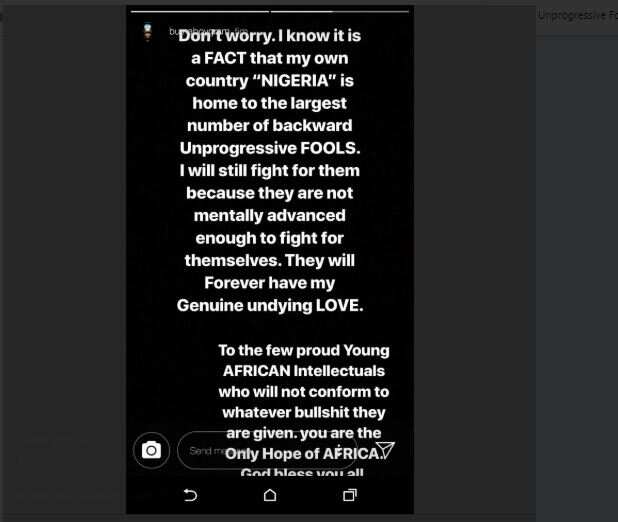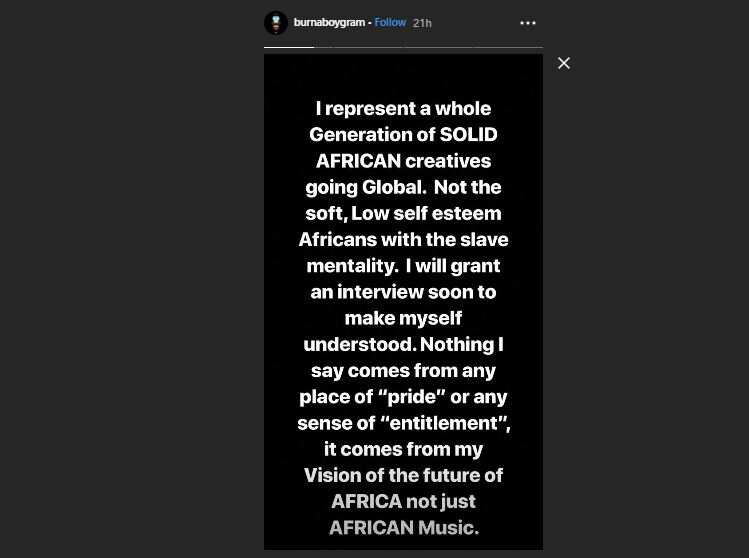Recently, Legit.ng reported that singers Mr Eazi and Burna Boy were selected as choice musicians to participate in one of the world's biggest music event Coachella. After the news broke, it was also said that Damini Ogulu who is known as Burna Boy took to Instagram to call out the organisers of the program.
According to him, he did not like that his name was spelt out in small font. He demanded that Coachella make a correction to the way they wrote his stage name. In his address to the organisers of the music festival which is to start in April, the Gbona crooner called himself an African giant.
This statement sparked a lot of controversy amongst Nigerians who interpreted it to mean that he was proud and rude. It would appear that Burna Boy who was largely trolled by many did not take the insults very lightly.
He took it to heart or why else would the phenomenal Nigerian singer take to his page to call out many Nigerians and tag them as "backward, unprogressive fools"?
READ ALSO: Stellar photos from Burna Boy's sold out concert
Burna Boy had a lot to say to Nigerians on his Insta story. After saying that they were backward and unprogressive, he also went on to say that the nation was full of people who were not mentally advanced.
According to him, regardless of their deficiencies, he intended to love them and fight for them. Burna Boy, however, had one or two things to say about Nigerian youths who 'key into his vision'.
READ ALSO: NAIJ.com upgrades to Legit.ng: a letter from our Editor-in-Chief Bayo Olupohunda
See his post below:

Burna Boy goes on a rant, says Nigeria houses the largest number of backward unprogressive fools Source: Burnaboygram/Instagram
Source: Instagram
Beyond this, Burna Boy directly addressed the words that were thrown at him the previous day. He said that he was not exactly saying anything out of pride but out of a will to represent Nigeria and Africa as it should.
PAY ATTENTION: Get your daily relationship tips and advice on Africa Love Aid group

He also directly addressed his trolls by saying he is not proud Source: Burnaboygram/Instagram
Source: Instagram
Indeed, his posts have generated a lot of reactions from many people who were not pleased with his words in the least. Several people considered his statements an insult to the country but some people defended the 27-year-old singer by saying he actually said what Nigerians needed to hear about the moment.
PAY ATTENTION: Read best news on Nigeria's #1 news app
Burna Boy who recently organised a sold out concert has been praised by many Nigerians as one of the greatest Nigerian entertainers. Due to the excessive performances he did during the end of the year, he broke down massively despite the fact that he rarely fell sick.
NAIJ.com (naija.ng) -> Legit.ng We have upgraded to serve you better
Who was Nigeria’s biggest entertainer in 2018? | Legit TV
Source: Legit.ng
from Nigeria News today & Breaking Naija news ▷ Read on LEGIT.NG 24/7 http://bit.ly/2R6ycxx
via EDUPEDIA24/7
Comments
Post a Comment